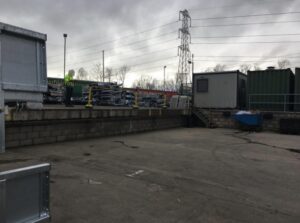Haulage company fined after worker dies from injuries
A haulage company in Wales has been fined £100,000 after a worker fell from a loading bay and died.
The 63-year-old, from Hungary, had been preparing a load of trailers in his lorry ahead of departure from Williams Haulage Limited’s site at Deeside Industrial Estate on 16 March 2020. The load of trailers were due to be delivered to a site in Germany. He was not employed by Williams Haulage.
The man was trying to reach the top of his lorry, with one foot on the loading bay and the other on the back of another lorry.
However, he fell approximately 1.25 metres onto the concrete floor below when the adjacent lorry was driven away.

He sustained severe head injuries and died at the Royal Stoke University Hospital on 16 May 2020.
A Health and Safety Executive (HSE) investigation into this incident found Williams Haulage had carried out a risk assessment that identified the risk from falls and introduced control measures, but these had not been used in practice. There was a lack of supervision and monitoring by Williams Haulage to check that these control measures were being used by its staff. Additionally, insufficient consideration had been given to visiting drivers, particularly when English is not their first language.
HSE guidance can be found at: Management responsibilities – Workplace transport (hse.gov.uk)

Williams Haulage Limited, of Old Station Road, Cynwyd, Corwen, Clwyd, pleaded guilty to breaching Section 3 (1) of the Health and Safety at Work etc. Act 1974. The company was fined £100,000 and ordered to pay £8,400.50 in costs at Llandudno Magistrates’ Court on 20 September 2023.
HSE inspector Matthew Pendle said: “Any fall can have devastating consequences – as has been shown in this case of a man working far from home. Haulage by nature means drivers who do not always speak English can visit sites – they must be protected.
“This incident could so easily have been avoided had the company simply ensured the control measures and safe working practices were followed and that visiting drivers were informed of the site’s safety rules.”
This HSE prosecution was supported by HSE enforcement lawyer Nathan Cook.
Notes to Editors:
- The Health and Safety Executive (HSE) is Britain’s national regulator for workplace health and safety. We seek to prevent work-related death, injury and ill health through regulatory actions that range from influencing behaviours across whole industry sectors through to targeted interventions on individual businesses. These activities are supported by globally recognised scientific expertise. hse.gov.uk
- More about the legislation referred to in this case can be found at: legislation.gov.uk/
- HSE news releases are available at http://press.hse.gov.uk
